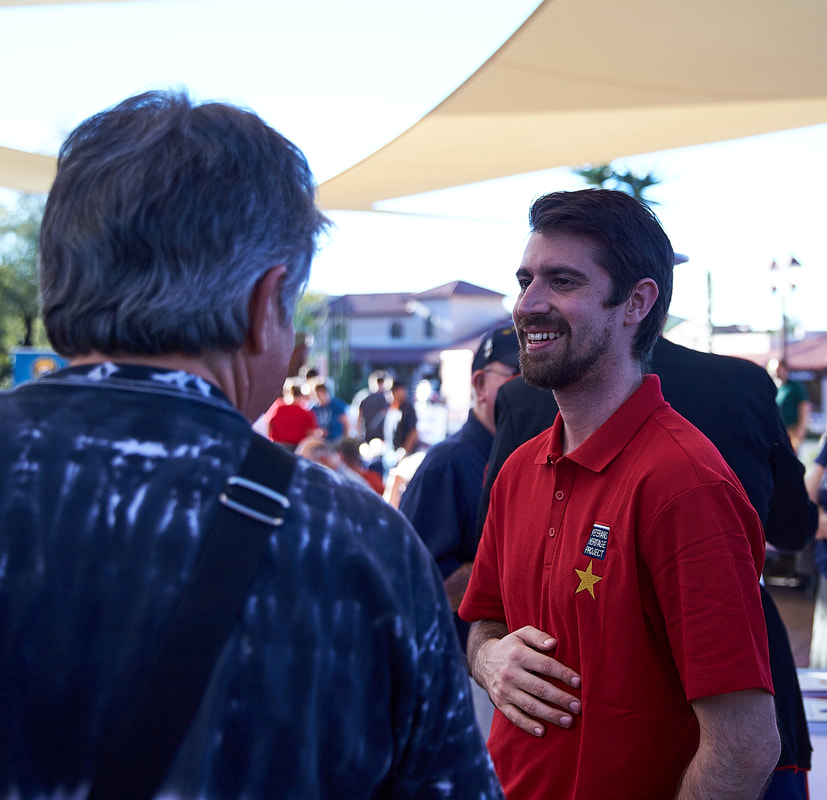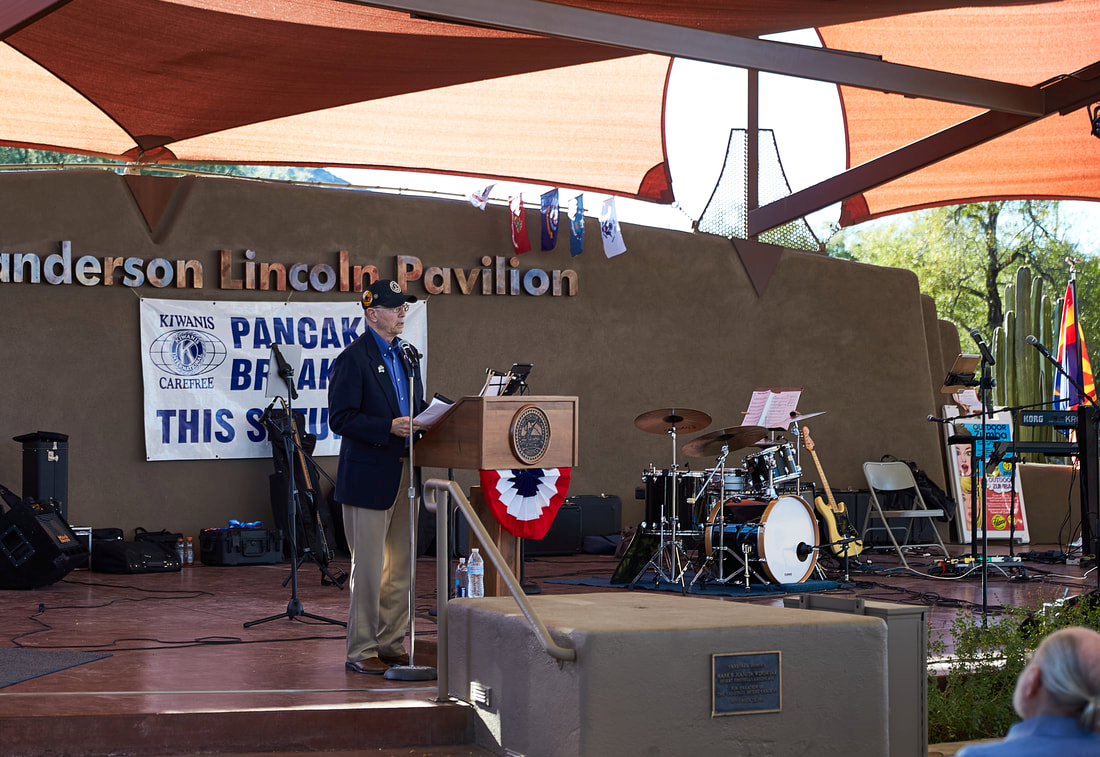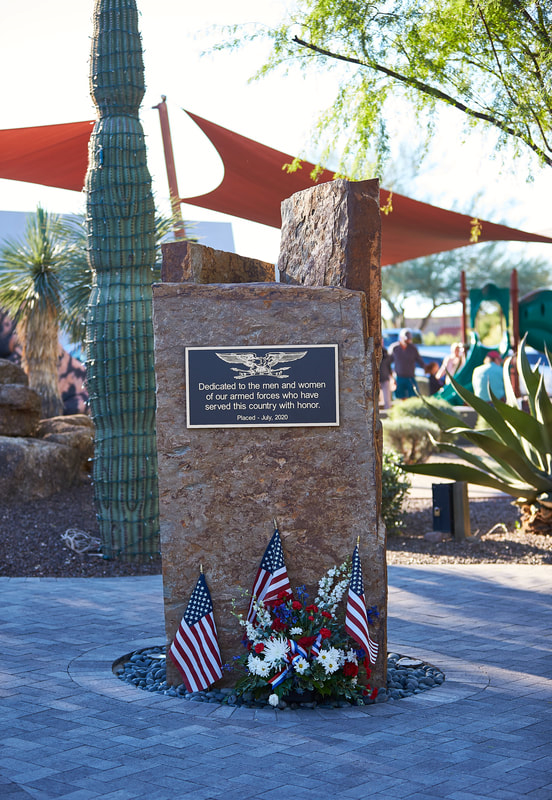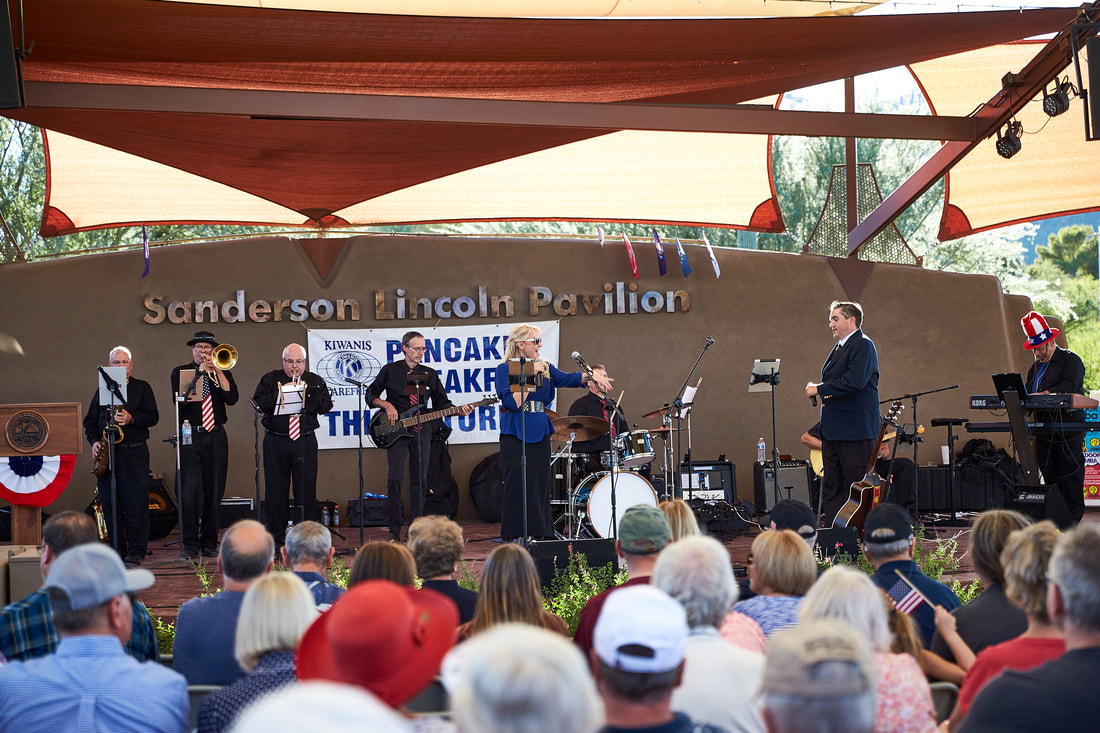"Thomas Jefferson said a democracy is dependent on an informed citizenry. I don't care whether it sounds corny or not. It's the truth." -Jim Lehrer
Carefree Truth
Issue #966, November 19, 2021
Issue #966, November 19, 2021
Preston Westmoreland introduced Bret Lineburg, who teaches World History and American Military History at Cactus Shadows High School (CSHS). Bret has served as the Veterans Heritage Project (VHP) CSHS administrator for 5 years.
Bret Lineburg
Photo by Herbert Hitchon
Bret thanked everyone for coming. It's such an amazing opportunity and an amazing experience every year, and he's glad that Carefree and Cave Creek celebrate Veterans Day every year.
He has been teaching at CSHS for 7 years. After being there for a year, he got a knock on his door and got to meet Barbara Hatch, the founder of VHP, and discovered that he was teaching in her former classroom, where VHP started. It was a meeting of fate and an opportunity to which he could not say no. It was too important and too valuable. Once he started advising the club and sitting down conducting the interviews with the veterans and the students, it opened up his eyes to how important what they all do really is.
VHP was founded at CSHS in 2005 and has been going strong ever since. They have conducted over 2400 interviews, printed in 16 volumes of books. The most recent volume was published last year, "Since You Asked, Volume 17".
VHP connects students with veterans both in and outside of the community. They sit down, conduct interviews and talk with the veterans. It is so beneficial for the students to hear it in the veterans' own words, rather than what they hear in the news and in history classes. But it means a lot to the veterans too. It's an opportunity for them to express themselves and to speak in an open forum, knowing that the students are there because they want to know and to learn from them. For some, it's even a catalyst to begin the healing process for those who have dealt with such horrible experiences and need to talk about them.
Every year, the students do the interviews and write the stories. They are responsible for the layouts and organization. The stories are published into the volumes that are located on the VHP display table in the back of the Pavilion, and he encouraged those attending to stop by and view them. If anyone is interested in sitting down with any of his students, he said they would not regret it. It's an amazing opportunity for both of you, and it's an opportunity for them to develop some historical empathy and to understand in a very deep and meaningful way conflicts they would never have understood.
It doesn't matter is it was combat or non combat, logistics or JAG. We want to listen to every veteran's story and want everyone to participate and to understand how diverse the military is and what it does, and how much it does for the country and for the community. It's an awesome opportunity to teach these kids responsibility, personal integrity, historical empathy, and appreciation for the veterans in the community.
There was a sign-up sheet at the VHP table, and they were doing interviews next week. If any were interested in participating, he encouraged them to sign up and supply their information, and he would get them ready to go. Bret thanked everyone again, wished them Happy Veterans Day, and thanked them for their service, their integrity, and their compassion for everyone in the community.
https://vimeo.com/645443921
Preston said he got a pilot's "dream call" from Williams Air Force Base years ago. Williams was the busiest airport in the world, and their chief training center. The Public Information Officer said the Colonel of the base heard Preston talking about flying on the radio and wanted to take him for a ride in his jet. Preston was "like a kid in a candy store". He had to go through ejection seat training first. You
pull up and it's 25 Gs. If you are bent over, you can break your back. You must be sitting up straight and are wearing a pressurized suit. If there is a problem, the pilot will say, "Bail out" 3 times. Preston asked what if he was kidding. The pilot replied, "The 3rd time I say that, I'm gone. You're going to be in a missile with no engine, so you'd better bail out when I say it the 3rd time. We never kid about that".
Preston then introduced Lt. Mike Wold, U.S. Navy Reserve. Lt. Wold is the volunteer Arizona Regional Coordinator for the Institute for the Healing of Memories that holds weekend workshops for veterans and even 1st responders who have been traumatized by some of the emergency calls they answer. He is also an active member of the Franciscan Renewal Center, the Veteran Ministry, and a co-leader of the Arizona Coalition for Military Families, Be Connected Faith Network.
Photo by Herbert Hitchon
Bret thanked everyone for coming. It's such an amazing opportunity and an amazing experience every year, and he's glad that Carefree and Cave Creek celebrate Veterans Day every year.
He has been teaching at CSHS for 7 years. After being there for a year, he got a knock on his door and got to meet Barbara Hatch, the founder of VHP, and discovered that he was teaching in her former classroom, where VHP started. It was a meeting of fate and an opportunity to which he could not say no. It was too important and too valuable. Once he started advising the club and sitting down conducting the interviews with the veterans and the students, it opened up his eyes to how important what they all do really is.
VHP was founded at CSHS in 2005 and has been going strong ever since. They have conducted over 2400 interviews, printed in 16 volumes of books. The most recent volume was published last year, "Since You Asked, Volume 17".
VHP connects students with veterans both in and outside of the community. They sit down, conduct interviews and talk with the veterans. It is so beneficial for the students to hear it in the veterans' own words, rather than what they hear in the news and in history classes. But it means a lot to the veterans too. It's an opportunity for them to express themselves and to speak in an open forum, knowing that the students are there because they want to know and to learn from them. For some, it's even a catalyst to begin the healing process for those who have dealt with such horrible experiences and need to talk about them.
Every year, the students do the interviews and write the stories. They are responsible for the layouts and organization. The stories are published into the volumes that are located on the VHP display table in the back of the Pavilion, and he encouraged those attending to stop by and view them. If anyone is interested in sitting down with any of his students, he said they would not regret it. It's an amazing opportunity for both of you, and it's an opportunity for them to develop some historical empathy and to understand in a very deep and meaningful way conflicts they would never have understood.
It doesn't matter is it was combat or non combat, logistics or JAG. We want to listen to every veteran's story and want everyone to participate and to understand how diverse the military is and what it does, and how much it does for the country and for the community. It's an awesome opportunity to teach these kids responsibility, personal integrity, historical empathy, and appreciation for the veterans in the community.
There was a sign-up sheet at the VHP table, and they were doing interviews next week. If any were interested in participating, he encouraged them to sign up and supply their information, and he would get them ready to go. Bret thanked everyone again, wished them Happy Veterans Day, and thanked them for their service, their integrity, and their compassion for everyone in the community.
https://vimeo.com/645443921
Preston said he got a pilot's "dream call" from Williams Air Force Base years ago. Williams was the busiest airport in the world, and their chief training center. The Public Information Officer said the Colonel of the base heard Preston talking about flying on the radio and wanted to take him for a ride in his jet. Preston was "like a kid in a candy store". He had to go through ejection seat training first. You
pull up and it's 25 Gs. If you are bent over, you can break your back. You must be sitting up straight and are wearing a pressurized suit. If there is a problem, the pilot will say, "Bail out" 3 times. Preston asked what if he was kidding. The pilot replied, "The 3rd time I say that, I'm gone. You're going to be in a missile with no engine, so you'd better bail out when I say it the 3rd time. We never kid about that".
Preston then introduced Lt. Mike Wold, U.S. Navy Reserve. Lt. Wold is the volunteer Arizona Regional Coordinator for the Institute for the Healing of Memories that holds weekend workshops for veterans and even 1st responders who have been traumatized by some of the emergency calls they answer. He is also an active member of the Franciscan Renewal Center, the Veteran Ministry, and a co-leader of the Arizona Coalition for Military Families, Be Connected Faith Network.
Lt. Mike Wold
Photo by Herbert Hitchon
Lt. Wold assisted in the Veterans Memorial Monument Project in Carefree.
Photo by Herbert Hitchon
Lt. Wold assisted in the Veterans Memorial Monument Project in Carefree.
Carefree Veterans Memorial Monument
Photo by Herbert Hitchon
Lt. Wold served off the coast of Vietnam on a refueling oiler. Preston got to see a refueling when he was leaving Danang harbor. It's an amazing choreography of ships underway, firing cables back and forth.
“Is it worth it?”
by Lt. Mike Wold
"I am a U.S. Navy Vietnam veteran. I was an officer on a U.S. Navy oiler that refueled ships 24/7 up and down the Vietnam coast from the South China Sea to the Gulf of Tonkin in 1968 and 1969.
I am going to discuss a question that I am sure many vets ask themselves - 'Were the sacrifices that we made worth making?' I am sure this is especially true for those vets who sacrificed much more than I did and perhaps even lost more friends and relatives than I did.
Let me say from the start that I know that every veteran has to come up with the answer to this question on their own. All I hope to do in this talk is to give my veteran brothers and sisters a new perspective on this question to consider.
I had been thinking about this question for many years after I left the Navy in 1970 when an incident occurred which had a big impact on my thinking. About 10 years ago I was waiting in a line at a garage to have my car serviced. I had been in the line for a while when I noticed that a Vietnamese man was standing behind me. To make conversation with him I mentioned that I had been in the U.S. Navy during the Vietnam War.
All of a sudden that man’s eyes began to water and he reached out and took my hands in his. He held them tightly and thanked me for saving his life twice. He explained that in 1955 he and his family were rescued by the U.S. Navy and brought from North Vietnam to South Vietnam. He said that 20 years later, in 1975, a U.S. Navy carrier picked up him and his family up from a boat that they were in. He was one of the famous Vietnamese boat people. His name was Chung Hoang.
I wondered how many Vietnamese were in the same situation as my new friend Chung. The United Nations High Commission on Refugees estimated that about 800,000 “boat people” escaped safely to other countries from Vietnam between 1975 and 1995, with another 200,000 to 400,000 perishing at sea.
He said that because of the U.S. Navy in which I served, he and his family have been able to enjoy freedom in the U.S. He said that he was not able to master the English language too well so that he could only get menial jobs and worked three jobs at the time. He said that his wife was able to master the language and worked for the Minnesota Human Services Department as an interpreter.
Chung invited me to a traditional Vietnamese lunch at his house. In the realm of no coincidences, the date he picked was Veterans Day. I arrived at his house and was provided with a delicious Vietnamese meal by his wife. After the meal he asked me if I would like to see the pictures of his three children. I said yes and he led me into another room where there were large pictures of three nice looking young adults. He pointed to his son’s picture and said that he was a thoracic surgeon at the University of San Francisco Medical Center. His daughter was an attorney for a prestigious Minneapolis law firm and his other daughter was in nursing school at the University of Minnesota. Truly an example of the American dream made possible by the freedoms we enjoy.
It turned out that we were members of the same church. Every time he would see me at a church service, he would stop by my pew and bow to me.
This experience got me thinking. The wars our country have been in over the years have been motivated by a complex set of reasons – economic, national defense and political, but one common thread in almost all of our wars has been a desire to give people the same freedom that we enjoy. This of course started with our own Revolutionary War. This country was not about taking over other countries. General Colin Powell, God rest his soul, once said that the only land the United States asked for was a small plot of land to bury our dead service members.
I started thinking back over the wars that my relatives had served in. My dad and four uncles were combat vets in WWII. Yes, the price my family paid was great. In WWII one uncle, a U.S. Marine, was killed in action on the beach in the invasion of Tinian Island in the Marianas. One uncle was shot down twice – once in North Africa and again in Italy. He later suffered from untreated PTSD and became a lifelong alcoholic. Another uncle, a medic in the US Army in Korea, was a sole survivor of an attack and he too suffered from untreated PTSD and became a lifelong alcoholic. By the grace of God their efforts in WWII and Korea were successful in freeing Europe, the Western Pacific region and South Korea from tyranny.
In Vietnam and now in Afghanistan we were not successful in gaining freedom for their citizens, but does that mean we should not have tried or should never try again? A very difficult question that I will leave for each of my vet brothers and sisters to answer for themselves, but when I think about the story of my Vietnamese friend Chung who was so grateful to me and my U.S. Navy for giving him and his family their freedom, I am thinking maybe it was worth it."
https://vimeo.com/645460957
The Main Event Band played a number of popular songs next. https://vimeo.com/645472346
Photo by Herbert Hitchon
Lt. Wold served off the coast of Vietnam on a refueling oiler. Preston got to see a refueling when he was leaving Danang harbor. It's an amazing choreography of ships underway, firing cables back and forth.
“Is it worth it?”
by Lt. Mike Wold
"I am a U.S. Navy Vietnam veteran. I was an officer on a U.S. Navy oiler that refueled ships 24/7 up and down the Vietnam coast from the South China Sea to the Gulf of Tonkin in 1968 and 1969.
I am going to discuss a question that I am sure many vets ask themselves - 'Were the sacrifices that we made worth making?' I am sure this is especially true for those vets who sacrificed much more than I did and perhaps even lost more friends and relatives than I did.
Let me say from the start that I know that every veteran has to come up with the answer to this question on their own. All I hope to do in this talk is to give my veteran brothers and sisters a new perspective on this question to consider.
I had been thinking about this question for many years after I left the Navy in 1970 when an incident occurred which had a big impact on my thinking. About 10 years ago I was waiting in a line at a garage to have my car serviced. I had been in the line for a while when I noticed that a Vietnamese man was standing behind me. To make conversation with him I mentioned that I had been in the U.S. Navy during the Vietnam War.
All of a sudden that man’s eyes began to water and he reached out and took my hands in his. He held them tightly and thanked me for saving his life twice. He explained that in 1955 he and his family were rescued by the U.S. Navy and brought from North Vietnam to South Vietnam. He said that 20 years later, in 1975, a U.S. Navy carrier picked up him and his family up from a boat that they were in. He was one of the famous Vietnamese boat people. His name was Chung Hoang.
I wondered how many Vietnamese were in the same situation as my new friend Chung. The United Nations High Commission on Refugees estimated that about 800,000 “boat people” escaped safely to other countries from Vietnam between 1975 and 1995, with another 200,000 to 400,000 perishing at sea.
He said that because of the U.S. Navy in which I served, he and his family have been able to enjoy freedom in the U.S. He said that he was not able to master the English language too well so that he could only get menial jobs and worked three jobs at the time. He said that his wife was able to master the language and worked for the Minnesota Human Services Department as an interpreter.
Chung invited me to a traditional Vietnamese lunch at his house. In the realm of no coincidences, the date he picked was Veterans Day. I arrived at his house and was provided with a delicious Vietnamese meal by his wife. After the meal he asked me if I would like to see the pictures of his three children. I said yes and he led me into another room where there were large pictures of three nice looking young adults. He pointed to his son’s picture and said that he was a thoracic surgeon at the University of San Francisco Medical Center. His daughter was an attorney for a prestigious Minneapolis law firm and his other daughter was in nursing school at the University of Minnesota. Truly an example of the American dream made possible by the freedoms we enjoy.
It turned out that we were members of the same church. Every time he would see me at a church service, he would stop by my pew and bow to me.
This experience got me thinking. The wars our country have been in over the years have been motivated by a complex set of reasons – economic, national defense and political, but one common thread in almost all of our wars has been a desire to give people the same freedom that we enjoy. This of course started with our own Revolutionary War. This country was not about taking over other countries. General Colin Powell, God rest his soul, once said that the only land the United States asked for was a small plot of land to bury our dead service members.
I started thinking back over the wars that my relatives had served in. My dad and four uncles were combat vets in WWII. Yes, the price my family paid was great. In WWII one uncle, a U.S. Marine, was killed in action on the beach in the invasion of Tinian Island in the Marianas. One uncle was shot down twice – once in North Africa and again in Italy. He later suffered from untreated PTSD and became a lifelong alcoholic. Another uncle, a medic in the US Army in Korea, was a sole survivor of an attack and he too suffered from untreated PTSD and became a lifelong alcoholic. By the grace of God their efforts in WWII and Korea were successful in freeing Europe, the Western Pacific region and South Korea from tyranny.
In Vietnam and now in Afghanistan we were not successful in gaining freedom for their citizens, but does that mean we should not have tried or should never try again? A very difficult question that I will leave for each of my vet brothers and sisters to answer for themselves, but when I think about the story of my Vietnamese friend Chung who was so grateful to me and my U.S. Navy for giving him and his family their freedom, I am thinking maybe it was worth it."
https://vimeo.com/645460957
The Main Event Band played a number of popular songs next. https://vimeo.com/645472346
The Main Event Band
Photo by Herbert Hitchon
After they played, Preston told a story about meeting Gordon Lightfoot backstage after a concert in Phoenix. He asked if ours was the Carefree Highway Gordon wrote the song about that sold millions of records around the world. He said, "Absolutely". Their tour bus was coming down from Flagstaff on I-17, going to Gamage Auditorium in Phoenix, and he saw the exit sign for Carefree Highway. He told the bus driver to stop. He took a picture of the sign, which he had blown up professionally, and it hangs on his living room wall. He wrote the song on the way to Gamage Auditorium.
Lyn Hitchon
Prepared by Carefree Truth
Copyrighted
Visit our website at www.carefreetruth2.com If you know anyone who would like to be added to the Carefree Truth email list, please have them contact me. Feel free to share Carefree Truth with others on your list.
Visit www.carefreeazbusinesses.com to see more info about businesses in Carefree. Please support our merchants.
Photo by Herbert Hitchon
After they played, Preston told a story about meeting Gordon Lightfoot backstage after a concert in Phoenix. He asked if ours was the Carefree Highway Gordon wrote the song about that sold millions of records around the world. He said, "Absolutely". Their tour bus was coming down from Flagstaff on I-17, going to Gamage Auditorium in Phoenix, and he saw the exit sign for Carefree Highway. He told the bus driver to stop. He took a picture of the sign, which he had blown up professionally, and it hangs on his living room wall. He wrote the song on the way to Gamage Auditorium.
Lyn Hitchon
Prepared by Carefree Truth
Copyrighted
Visit our website at www.carefreetruth2.com If you know anyone who would like to be added to the Carefree Truth email list, please have them contact me. Feel free to share Carefree Truth with others on your list.
Visit www.carefreeazbusinesses.com to see more info about businesses in Carefree. Please support our merchants.





